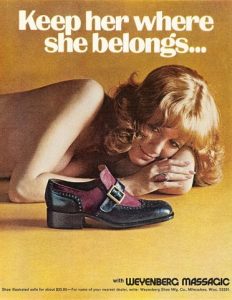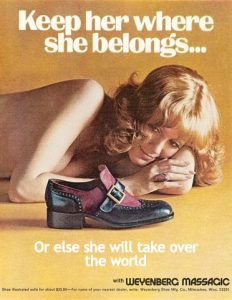Original Ad:

The above image appeared in a men magazine Playboy in 1974 which is an advert for Weyenberg Massagic shoes. The shoes are also for men, so the target is specifically a male audience. The first thing that you immediately notice on the picture is the sexual appeal – beautiful, naked woman lying on the floor gazing at a man’s shoe. I chose this ad because it’s not only sexist, but it’s also poorly written. The statement – “Keep her where she belongs…” leaves me confused because where does a woman belong? Does she belong on the floor staring at shoes? Naked on the floor? Or at your feet?
Firstly, this ad indicates a struggle to keep women “in their place.” Back in the days there was a fear of women escaping their traditional roles; therefore, men must work in order to “Keep her where she belongs”. In this ad, the woman is portrayed as beautiful and happily submissive with no desire to travel into the man’s domain.
Secondly, Male gaze are evident in this ad. It implies that if men buy the right shoes, women will be so delightful, so she remains at your feet just so she can glaze at the beautiful product. It implies that the way to keep your woman where “she belongs” is to buy her materialistic things.
This advertisement brings a message that women are only good enough to have servant’s roles and that that their minds and personalities don’t matter. This message has a tremendous effect on our society as it basically says that the best women can accomplish in life is to please a man.
Jammed Ad:

In my jamming, I added “Or else she will take over the world,” to explicitly point out what the advertisement is implying.
“Feminism was a hot topic at that time and Weyensen Massagic Footwear capitalized on the backlash against the movement” (Clark, 2015).
One of the major studies on “women in magazine advertising” has been conducted in 1970.
They found out that “The perspective presented in the ads were that:
- a woman’s place was in the home;
- women did not make important decisions or do important things;
- women were dependent upon men and needed men’s protection;
- men regarded women primarily as sexual objects and were not interested in women as people (Mager, 239).
People had a fear that women will have more autonomy outside of the home and that they will outdo the men. They also had a fear that women will completely abandon their roles and that society will change dramatically. In that case, how would a men’s role in society change? Would the women take over the world and would the men fade into the background?
Since the traditional roles were changing, people were resistance to keep things as they were. The fear of change is what caused this backlash against feminism in advertising.
WORKS CITED
Clark, Rosemary. #NotBuyingIt: Hashtag Feminists Expand the Commercial Media Conversation, Feminist Media Studies, 14:6, 1108-1110.
Mager, John and James Helgeson J. Fifty Years of Advertising Images: Some Changing Perspectives on Role Portrayals: Academic Search Premier, Ipswich, MA. Accessed May 12, 2015.
